Charles E W Bean, Diaries, AWM38 3DRL 606/101/1 - February - March 1918 - Part 3
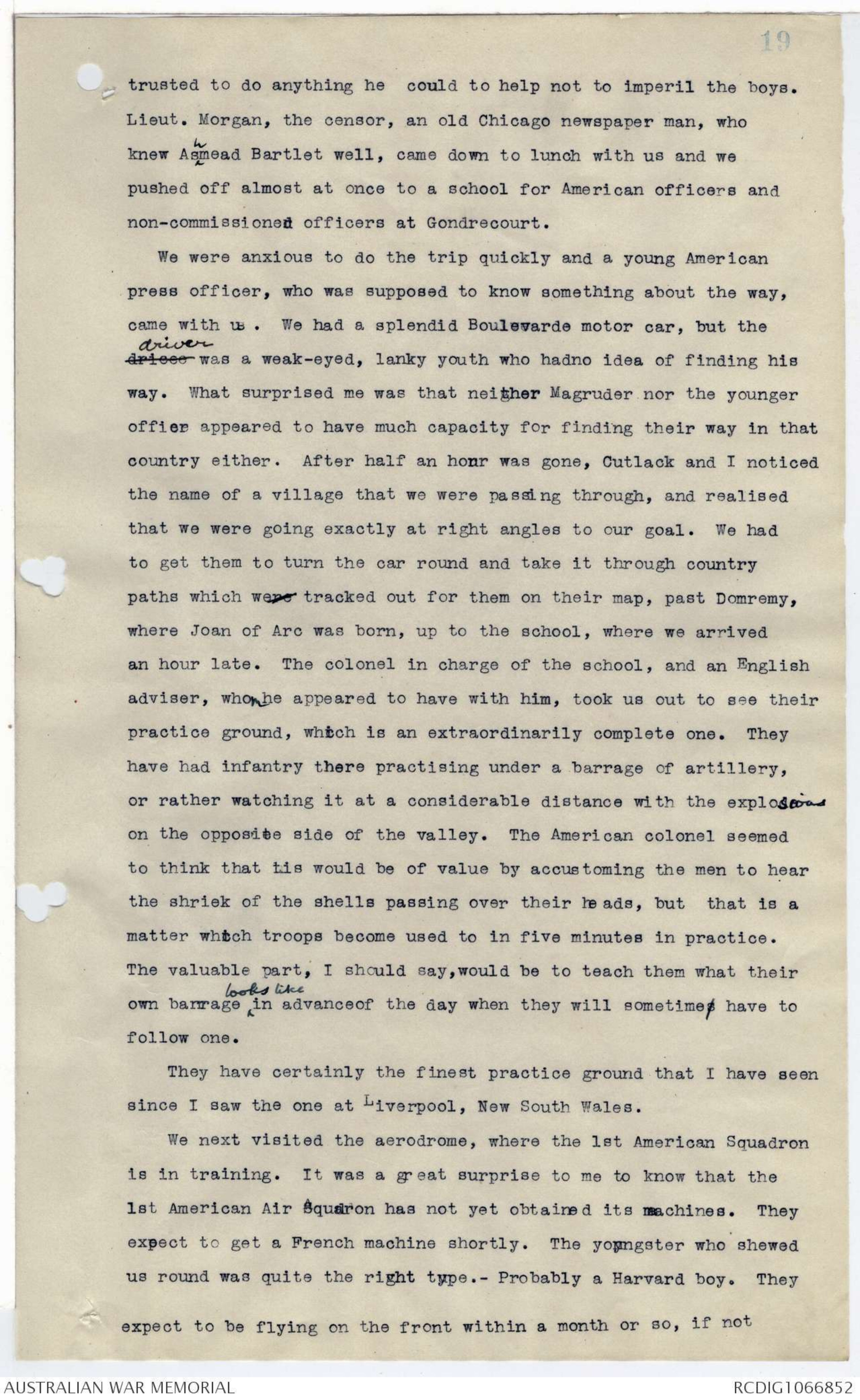
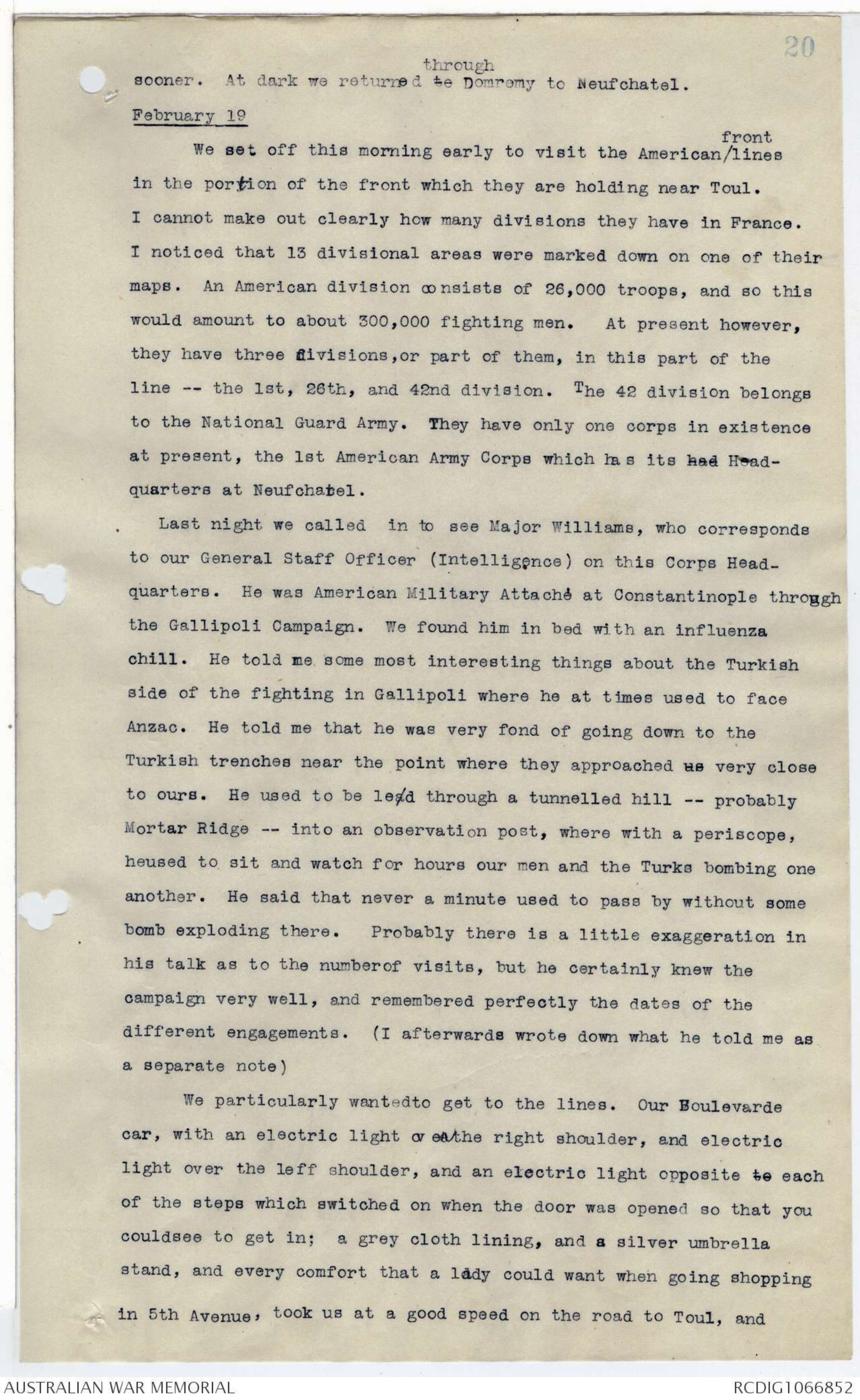
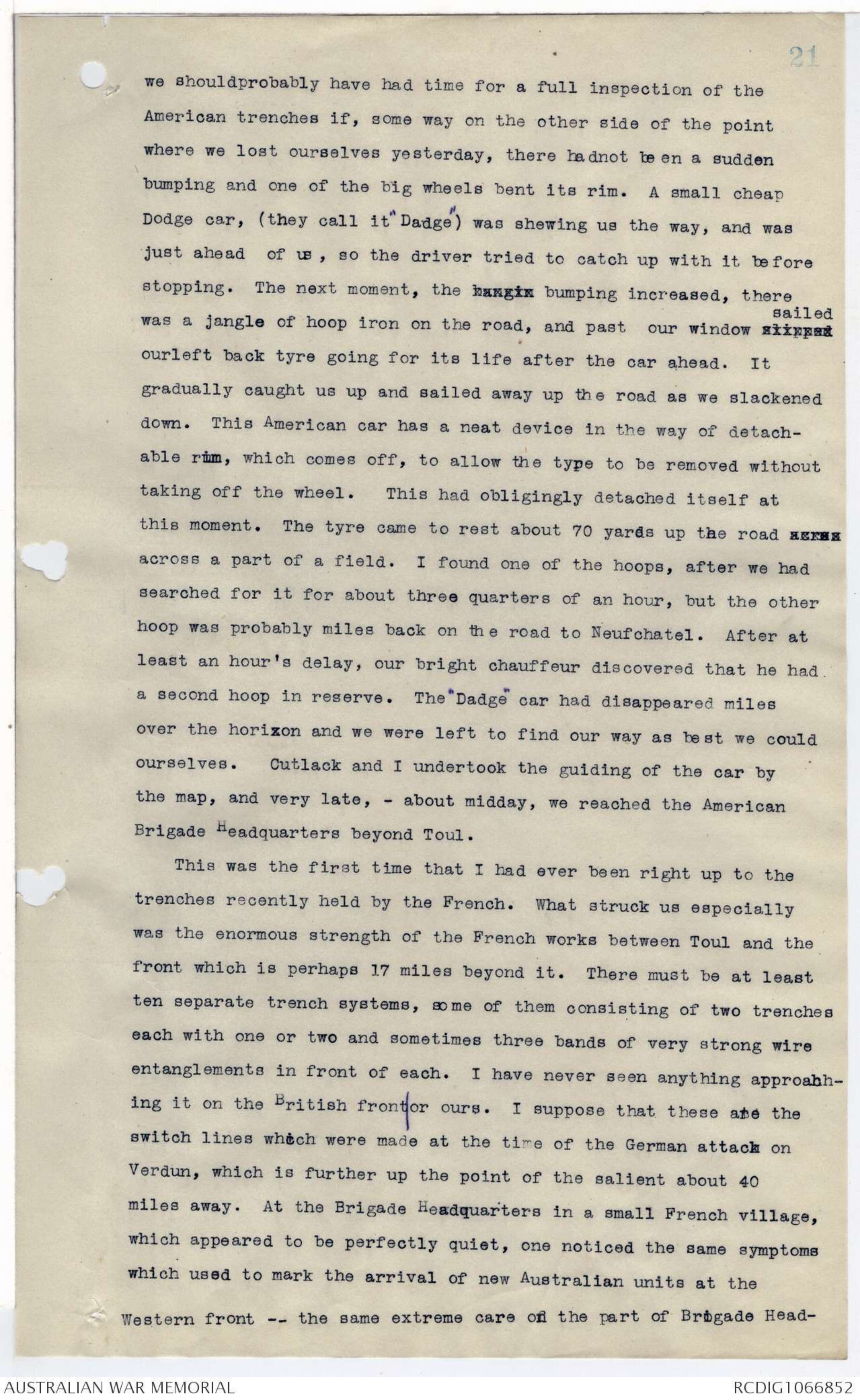
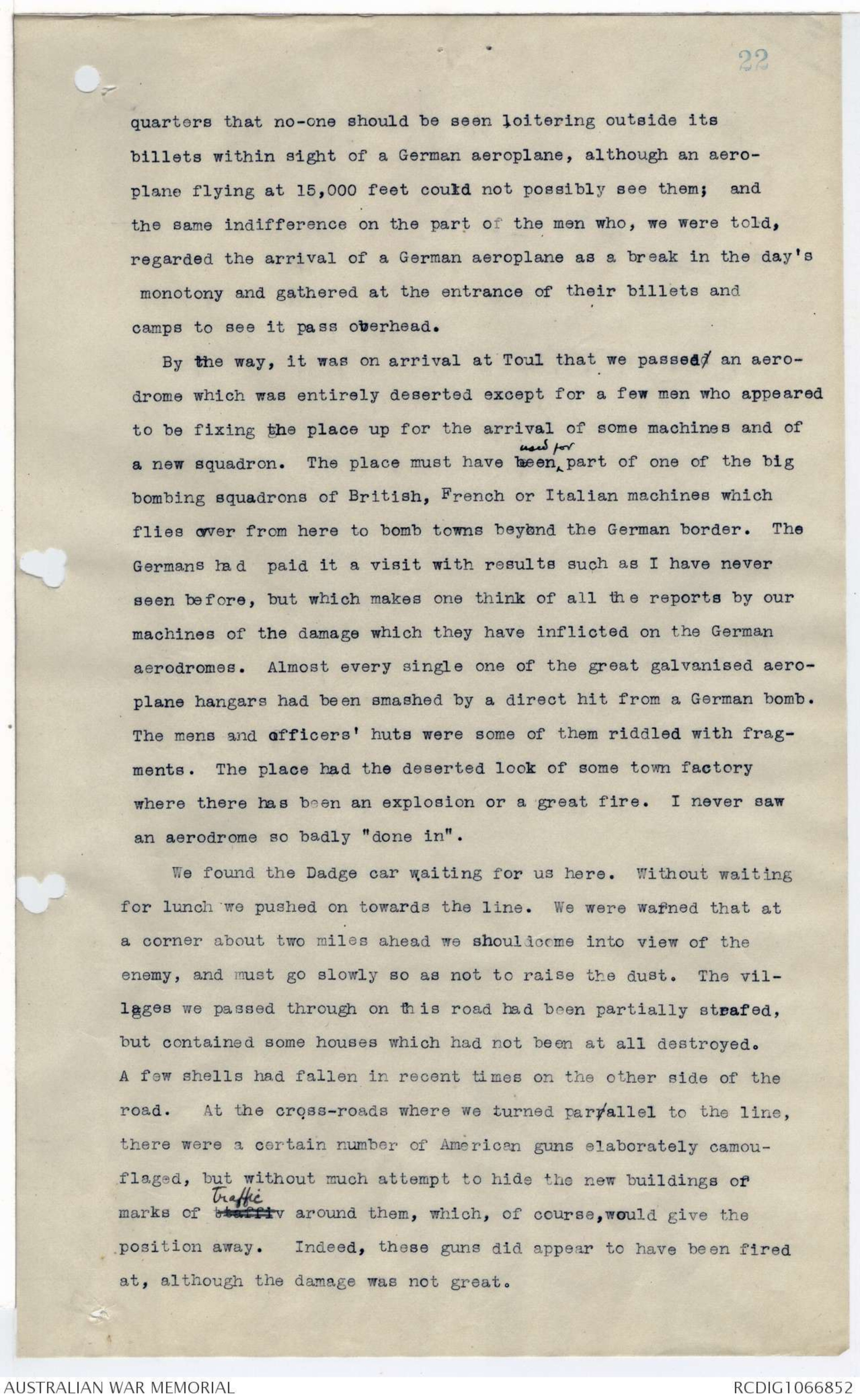
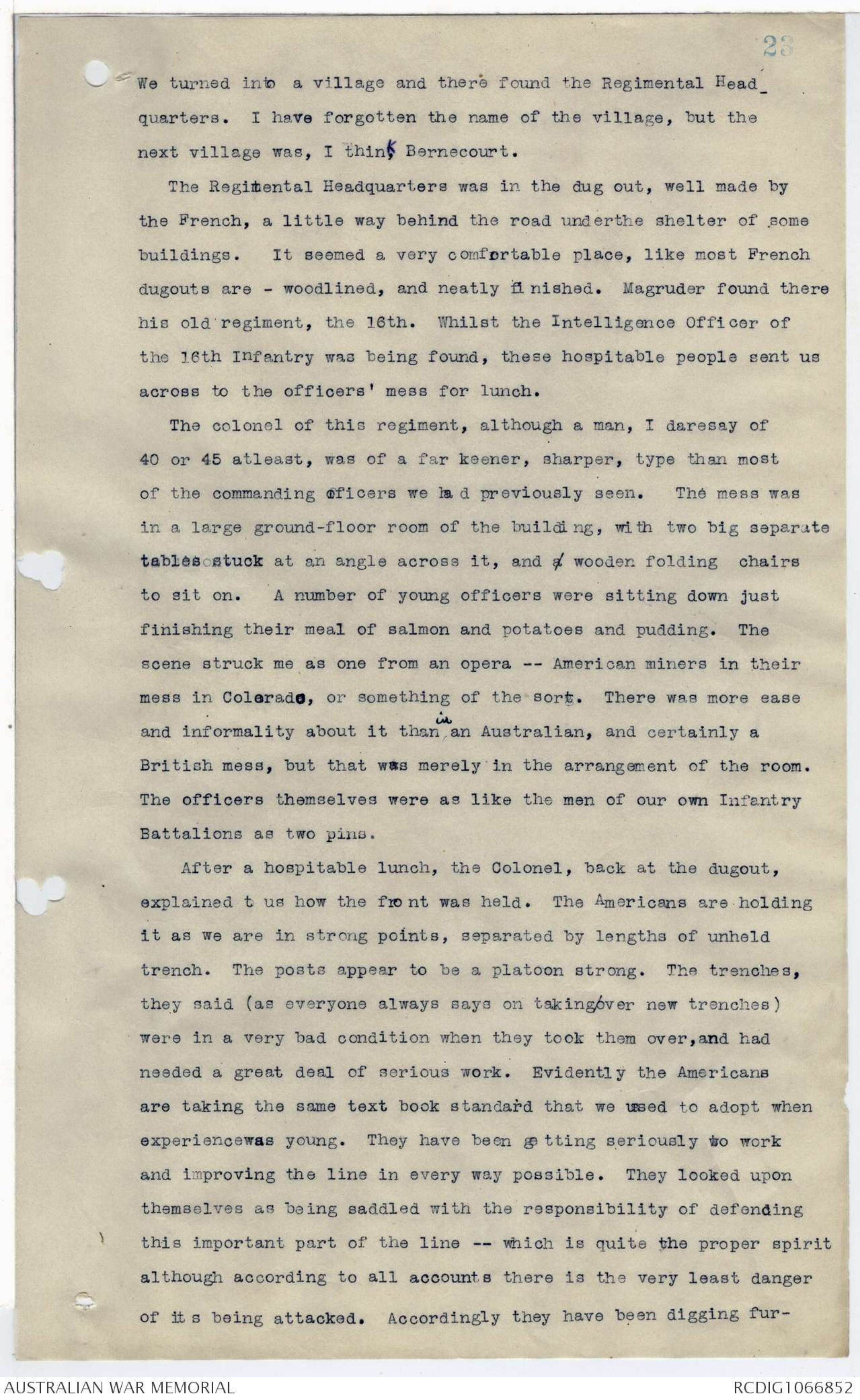
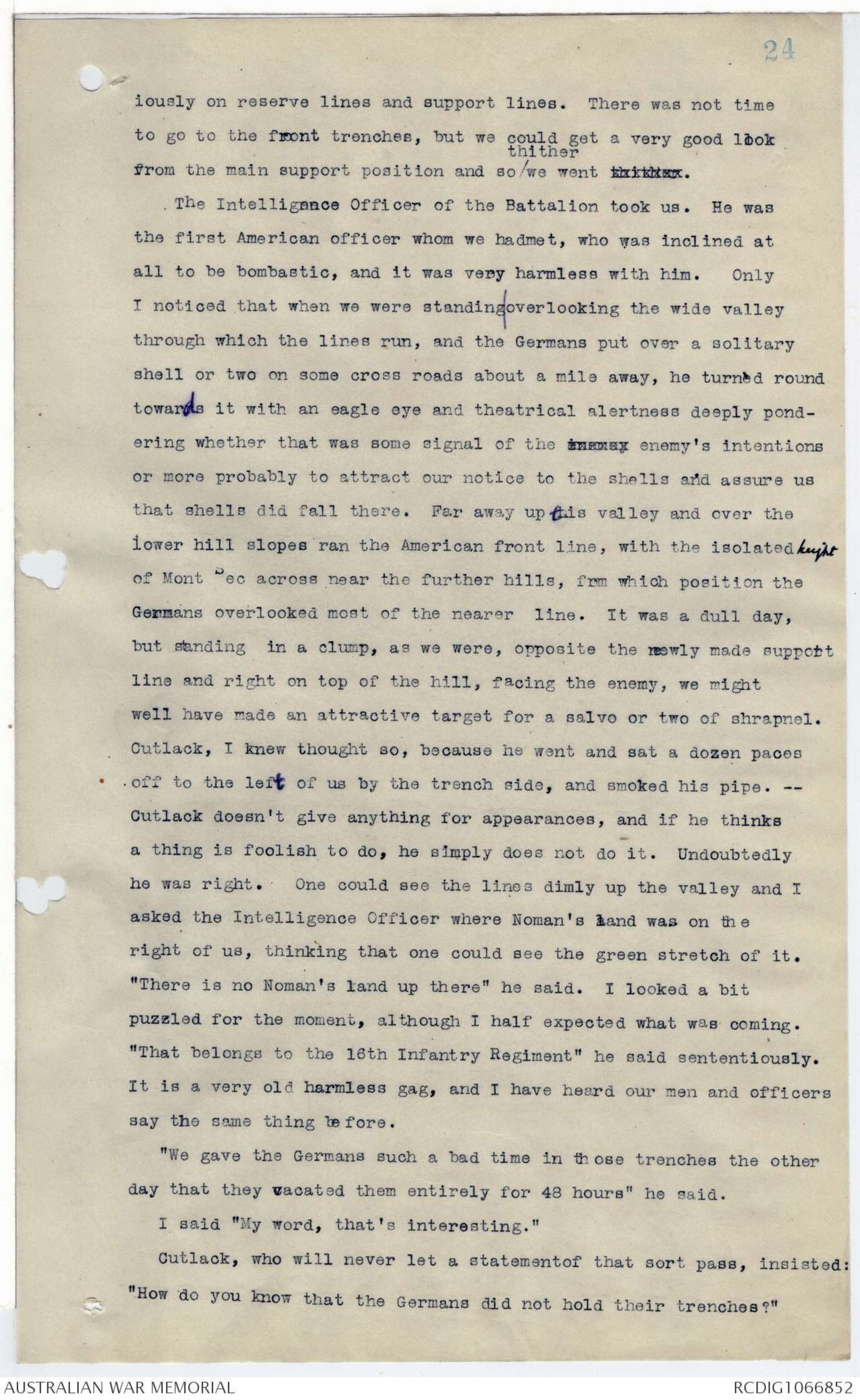
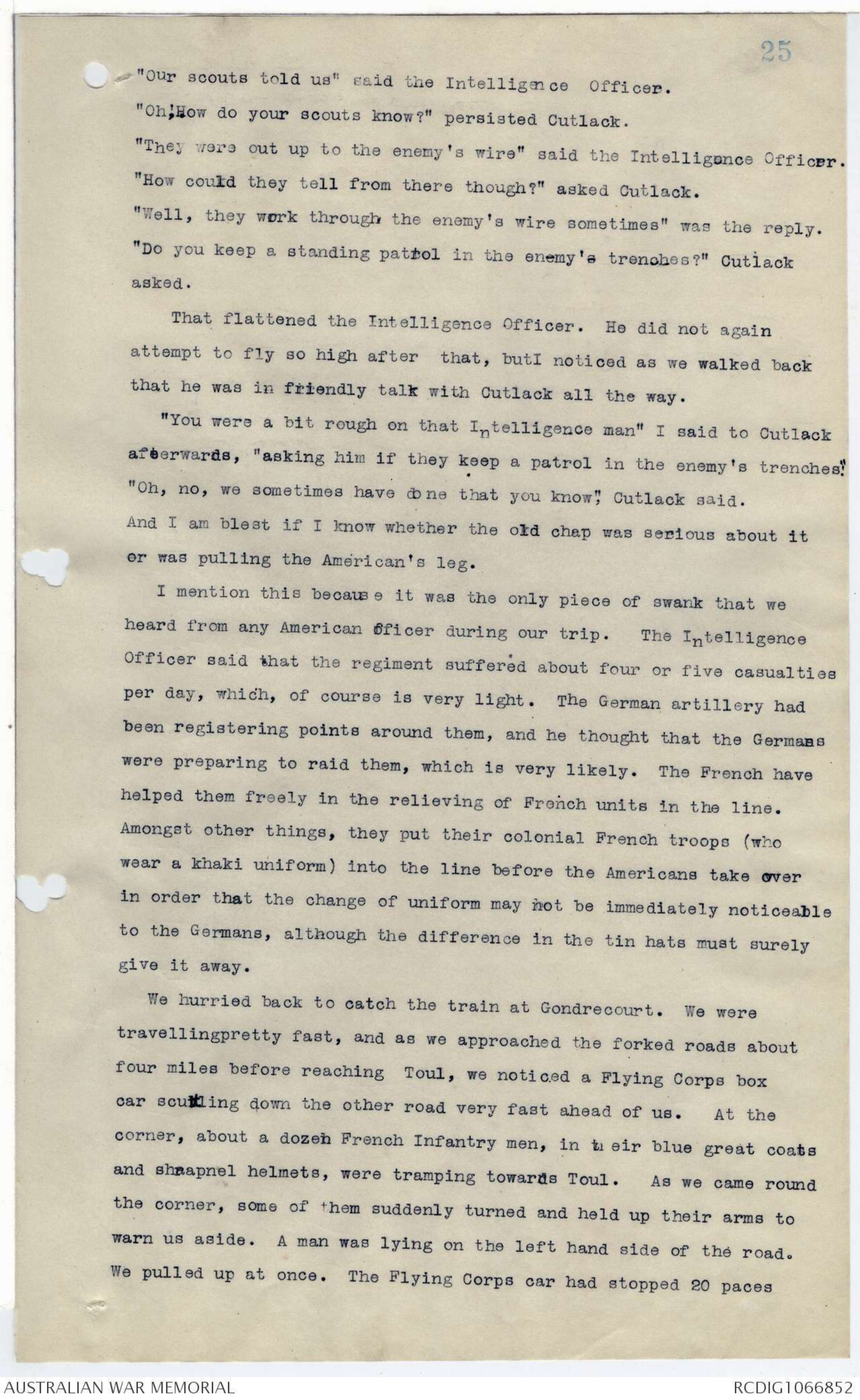
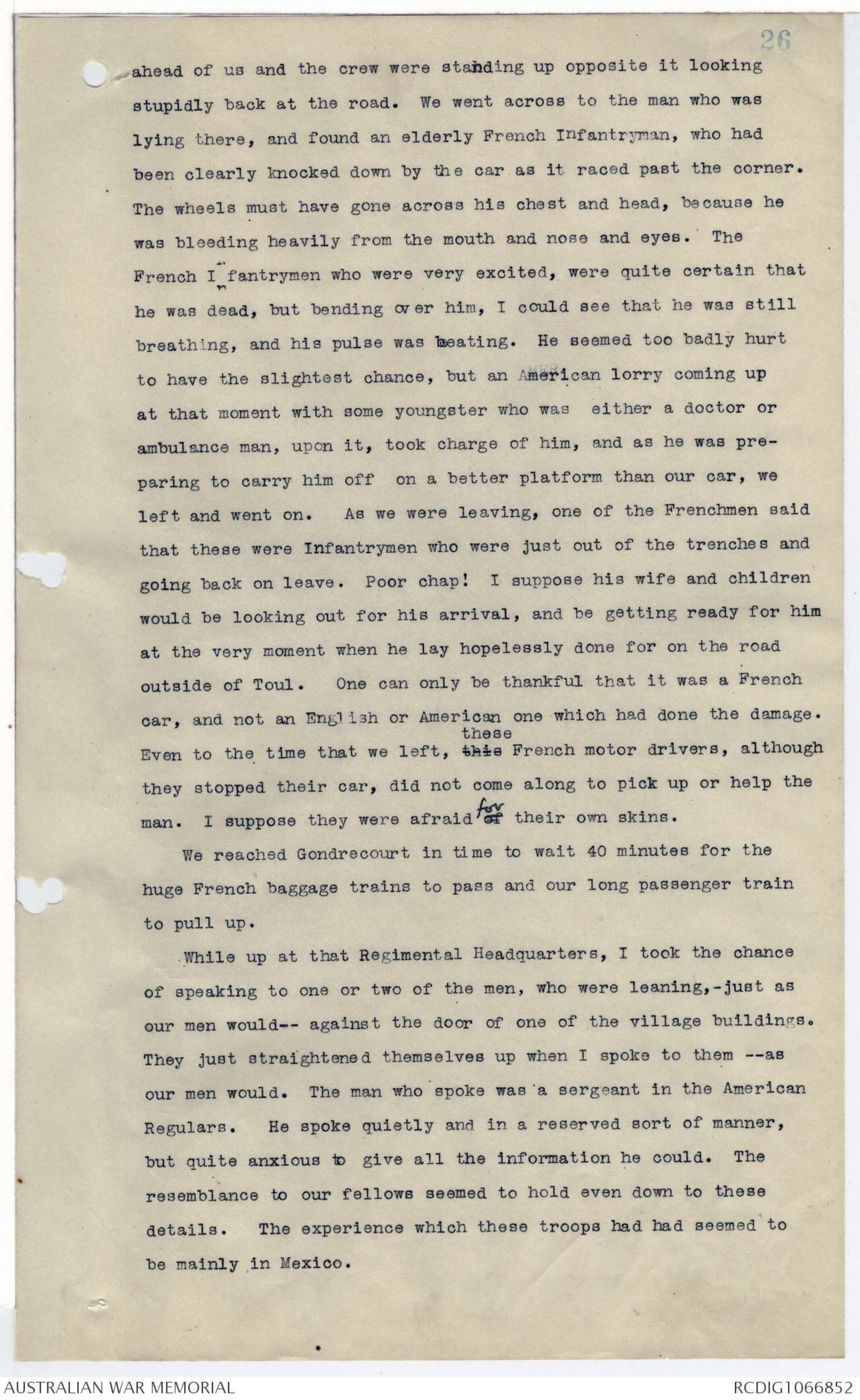
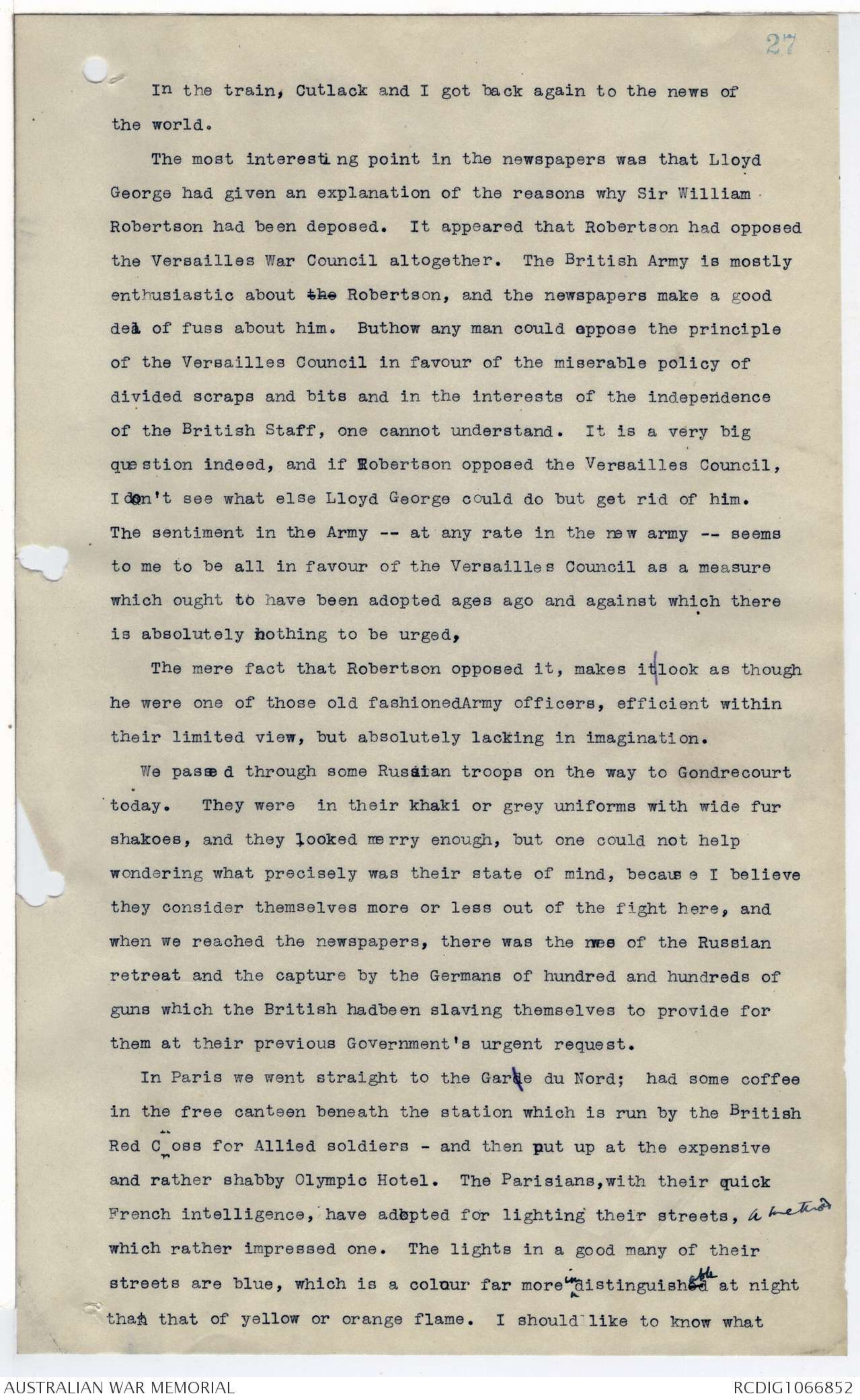
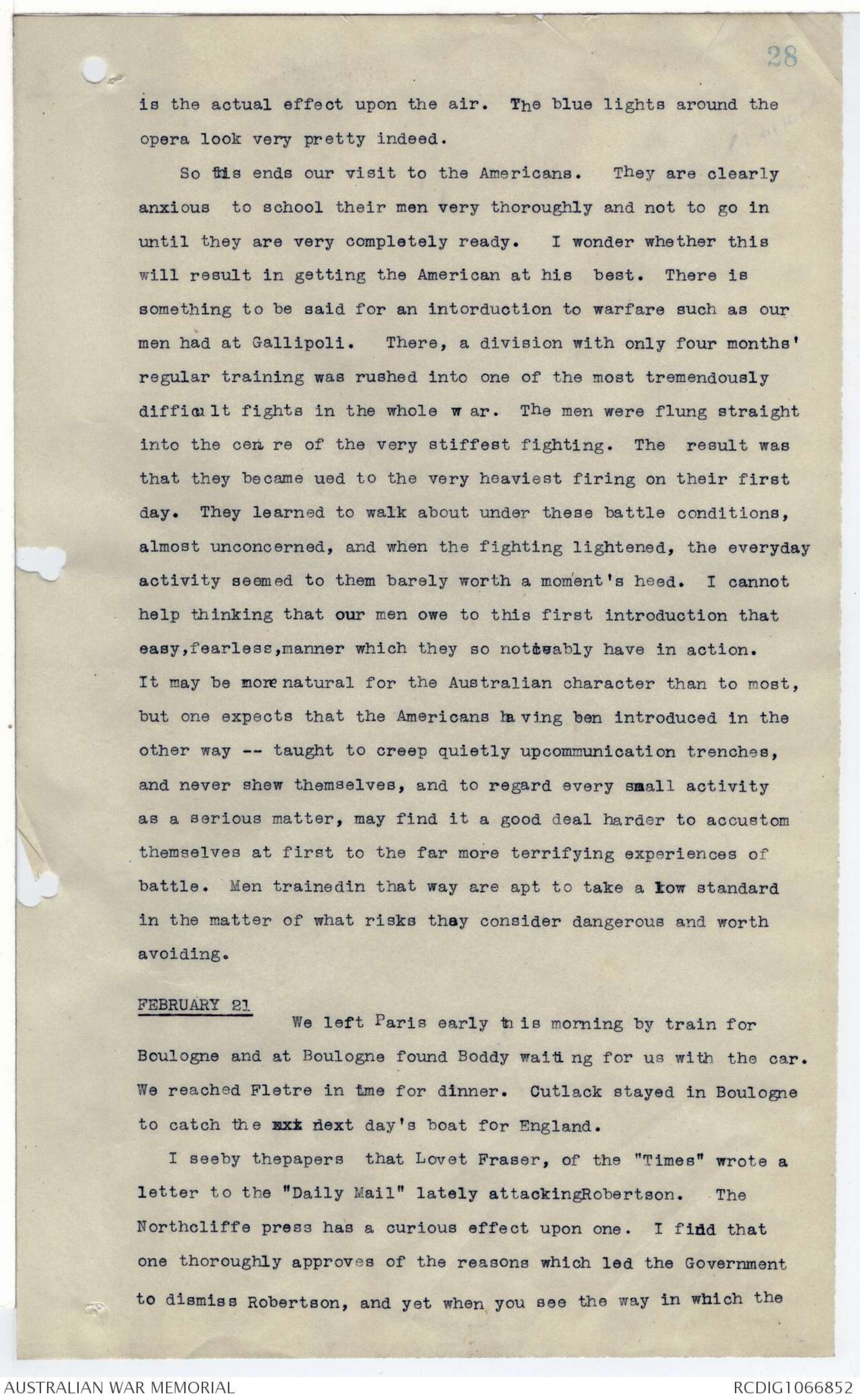
19
trusted to do anything he could to help not to imperil the boys.
Lieut. Morgan, the censor, an old Chicago newspaper man, who
knew As^hmead Bartlet well, came down to lunch with us and we
pushed off almost at once to a school for American officers and
non-commissioned officers at Gondrecourt.
We were anxious to do the trip quickly and a young American
press officer, who was supposed to know something about the way,
came with us . We had a splendid Boulevarde motor car, but thedriooo driver was a weak-eyed, lanky youth who hadno idea of finding his
way. What surprised me was that neither Magruder nor the younger
offier appeared to have much capacity for finding their way in that
country either. After half an hour was gone, Cutlack and I noticed
the name of a village that we were passing through, and realised
that we were going exactly at right angles to our goal. We had
to get them to turn the car round and take it through country
paths which were tracked out for them on their map, past Domremy,
where Joan of Arc was born, up to the school, where we arrived
an hour late. The colonel in charge of the school, and an English
adviser, whom he appeared to have with him, took us out to see their
practice ground, which is an extraordinarily complete one. They
have had infantry there practising under a barrage of artillery,
or rather watching it at a considerable distance with the explosions
on the opposite side of the valley. The American colonel seemed
to think that tis would be of value by accustoming the men to hear
the shriek of the shells passing over their he ads, but that is a
matter which troops become used to in five minutes in practice.
The valuable part, I should say,would be to teach them what their
own barrage ^looks like in advanceof the day when they will sometimes have to
follow one.
They have certainly the finest practice ground that I have seen
since I saw the one at Liverpool, New South Wales.
We next visited the aerodrome, where the 1st American Squadron
is in training. It was a great surprise to me to know that the
1st American Air Squadron has not yet obtained its machines. They
expect to get a French machine shortly. The youngster who shewed
us round was quite the right type.- Probably a Harvard boy. They
expect to be flying on the front within a month or so, if not
20
sooner. At dark we returned to through Domremy to Neufchatel.
February 19
We set off this morning early to visit the American /front lines
in the portion of the front which they are holding near Toul.
I cannot make out clearly how many divisions they have in France.
I noticed that 13 divisional areas were marked down on one of their
maps. An American division consists of 26,000 troops, and so this
would amount to about 300,000 fighting men. At present however,
they have three divisions, or part of them, in this part of the
line -- the 1st, 26th, and 42nd division. The 42 division belongs
to the National Guard Army. They have only one corps in existence
at present, the 1st American Army Corps which has its had Headquarters
at Neufchatel.
Last night we called in to see Major Williams, who corresponds
to our General Staff Officer (Intelligence) on this Corps Headquarters.
He was American Military Attaché at Constantinople through
the Gallipoli Campaign. We found him in bed with an influenza
chill. He told me some most interesting things about the Turkish
side of the fighting in Gallipoli where he at times used to face
Anzac. He told me that he was very fond of going down to the
Turkish trenches near the point where they approached us very close
to ours. He used to be lead through a tunnelled hill -- probably
Mortar Ridge –- into an observation post, where with a periscope,
heused to sit and watch for hours our men and the Turks bombing one
another. He said that never a minute used to pass by without some
bomb exploding there. Probably there is a little exaggeration in
his talk as to the numberof visits, but he certainly knew the
campaign very well, and remembered perfectly the dates of the
different engagements. (I afterwards wrote down what he told me as
a separate note)
We particularly wantedto get to the lines. Our Boulevarde
car, with an electric light ov er the right shoulder, and electric
light over the leff shoulder, and an electric light opposite to each
of the steps which switched on when the door was opened so that you
couldsee to get in; a grey cloth lining, and a silver umbrella
stand, and every comfort that a lady could want when going shopping
in 5th Avenue, took us at a good speed on the road to Toul, and
21
we shouldprobably have had time for a full inspection of the
American trenches if, some way on the other side of the point
where we lost ourselves yesterday, there hadnot been a sudden
bumping and one of the big wheels bent its rim. A small cheap
Dodge car, (they call it "Dadge") was shewing us the way, and was
just ahead of us, so the driver tried to catch up with it before
stopping. The next moment, the bangin bumping increased, there
was a jangle of hoop iron on the road, and past our window skipped sailed
ourleft back tyre going for its life after the car ahead. It
gradually caught us up and sailed away up the road as we slackened
down. This American car has a neat device in the way of detachable
rim, which comes off, to allow the type to be removed without
taking off the wheel. This had obligingly detached itself at
this moment. The tyre came to rest about 70 yards up the road acrss
across a part of a field. I found one of the hoops, after we had
searched for it for about three quarters of an hour, but the other
hoop was probably miles back on the road to Neufchatel. After at
least an hour's delay, our bright chauffeur discovered that he had
a second hoop in reserve. The "Dadge" car had disappeared miles
over the horizon and we were left to find our way as best we could
ourselves. Cutlack and I undertook the guiding of the car by
the map, and very late, - about midday, we reached the American
Brigade Headquarters beyond Toul.
This was the first time that I had ever been right up to the
trenches recently held by the French. What struck us especially
was the enormous strength of the French works between Toul and the
front which is perhaps 17 miles beyond it. There must be at least
ten separate trench systems, some of them consisting of two trenches
each with one or two and sometimes three bands of very strong wire
entanglements in front of each. I have never seen anything approaching
it on the British front/or ours. I suppose that these are the
switch lines which were made at the time of the German attack on
Verdun, which is further up the point of the salient about 40
miles away. At the Brigade Headquarters in a small French village,
which appeared to be perfectly quiet, one noticed the same symptoms
which used to mark the arrival of new Australian units at the
Western front - the same extreme care on the part of Brigade Headquarters
22.
that no-one should be seen loitering outside its
billets within sight of a German aeroplane, although an aeroplane
flying at 15,000 feet could not possibly see them; and
the same indifference on the part of the men who, we were told,
regarded the arrival of a German aeroplane as a break in the day's
monotony and gathered at the entrance of their billets and
camps to see it pass overhead.
By the way, it was on arrival at Toul that we passedd an aerodrome
which was entirely deserted except for a few men who appeared
to be fixing the place up for the arrival of some machines and of
a new squadron. The place must have been ^used for part of one of the big
bombing squadrons of British, French or Italian machines which
flies over from here to bomb towns beyond the German border. The
Germans had paid it a visit with results such as I have never
seen before, but which makes one think of all the reports by our
machines of the damage which they have inflicted on the German
aerodromes. Almost every single one of the great galvanised aeroplane
hangars had been smashed by a direct hit from a German bomb.
The mens and officers' huts were some of them riddled with fragments.
The place had the deserted look of some town factory
where there has been an explosion or a great fire. I never saw
an aerodrome so badly "done in".
We found the Dadge car waiting for us here. Without waiting
for lunch we pushed on towards the line. We were warned that at
a corner about two miles ahead we shouldcome into view of the
enemy, and must go slowly so as not to raise the dust. The villages
we passed through on this road had been partially strafed,
but contained some houses which had not been at all destroyed.
A few shells had fallen in recent times on the other side of the
road. At the cross-roads where we turned parrallel to the line,
there were a certain number of American guns elaborately camouflaged,
but without much attempt to hide the new buildings or
marks of ttaffiv traffic around them, which, of course, would give the
position away. Indeed, these guns did appear to have been fired
at, although the damage was not great.
23
We turned into a village and there found the Regimental Headquarters.
I have forgotten the name of the village, but the
next village was, I think Bernecourt.
The Regimental Headquarters was in the dug out, well made by
the French, a little way behind the road underthe shelter of some
buildings. It seemed a very comfortable place, like most French
dugouts are - woodlined, and neatly fi nished. Magruder found there
his old regiment, the 16th. Whilst the Intelligence Officer of
the 16th Infantry was being found, these hospitable people sent us
across to the officers' mess for lunch.
The colonel of this regiment, although a man, I daresay of
40 or 45 atleast, was of a far keener, sharper, type than most
of the commanding oficers we had previously seen. The mess was
in a large ground-floor room of the building, with two big separate
tables stuck at an angle across it, and a wooden folding chairs
to sit on. A number of young officers were sitting down just
finishing their meal of salmon and potatoes and pudding. The
scene struck me as one from an opera -- American miners in their
mess in Colorado, or something of the sort. There was more ease
and informality about it than ∧in an Australian, and certainly a
British mess, but that was merely in the arrangement of the room.
The officers themselves were as like the men of our own Infantry
Battalions as two pins.
After a hospitable lunch, the Colonel, back at the dugout,
explained t us how the front was held. The Americans are holding
it as we are in strong points, separated by lengths of unheld
trench. The posts appear to be a platoon strong. The trenches,
they said (as everyone always says on taking/over new trenches)
were in a very bad condition when they took them over, and had
needed a great deal of serious work. Evidently the Americans
are taking the same text book standard that we used to adopt when
experiencewas young. They have been getting seriously to work
and improving the line in every way possible. They looked upon
themselves as being saddled with the responsibility of defending
this important part of the line -- which is quite the proper spirit
although according to all accounts there is the very least danger
of its being attacked. Accordingly they have been digging furiously
24
on reserve lines and support lines. There was not time
to go to the front trenches, but we could get a very good look
from the main support position and so/thither we went thither.
The Intelligence Officer of the Battalion took us. He was
the first American officer whom we hadmet, who was inclined at
all to be bombastic, and it was very harmless with him. Only
I noticed that when we were standing/overlooking the wide valley
through which the lines run, and the Germans put over a solitary
shell or two on some cross roads about a mile away, he turned round
towards it with an eagle eye and theatrical alertness deeply pondering
whether that was some signal of the xxxxxx enemy's intentions
or more probably to attract our notice to the shells and assure us
that shells did fall there. Far away up this valley and over the
lower hill slopes ran the American front line, with the isolated height
of Mont Sec across near the further hills, from which position the
Germans overlooked most of the nearer line. It was a dull day,
but standing in a clump, as we were, opposite the newly made support
line and right on top of the hill, facing the enemy, we might
well have made an attractive target for a salvo or two of shrapnel.
Cutlack, I knew thought so, because he went and sat a dozen paces
off to the left of us by the trench side, and smoked his pipe.--
Cutlack doesn't give anything for appearances, and if he thinks
a thing is foolish to do, he simply does not do it. Undoubtedly
he was right. One could see the lines dimly up the valley and I
asked the Intelligence Officer where Noman's land was on the
right of us, thinking that one could see the green stretch of it.
"There is no Noman's land up there" he said. I looked a bit
puzzled for the moment, although I half expected what was coming.
"That belongs to the 16th Infantry Regiment" he said sententiously.
It is a very old harmless gag, and I have heard our men and officers
say the same thing before.
"We gave the Germans such a bad time in those trenches the other
day that they vacated them entirely for 48 hours" he said.
I said "My word, that's interesting."
Cutlack, who will never let a statementof that sort pass, insisted:
"How do you know that the Germans did not hold their trenches?”
25
"Our scouts told us" said the Intelligence Officer.
"Oh! How do your scouts know?" persisted Cutlack.
"They were out up to the enemy's wire" said the Intelligence Officer.
"How could they tell from there though?” asked Cutlack.
"Well, they work through the enemy's wire sometimes" was the reply.
"Do you keep a standing patrol in the enemy's trenches?" Cutlack
asked.
That flattened the Intelligence Officer. He did not again
attempt to fly so high after, that, butI noticed as we walked back
that he was in friendly talk with Cutlack all the way.
"You were a bit rough on that Intelligence man" I said to Cutlack
afterwards, "asking him if they keep a patrol in the enemy's trenches"
"Oh, no, we sometimes have done that you know", Cutlack said.
And I am blest if I know whether the old chap was serious about it
or was pulling the American's leg.
I mention this because it was the only piece of swank that we
heard from any American officer during our trip. The Intelligence
Officer said that the regiment suffered about four or five casualties
per day, which, of course is very light. The German artillery had
been registering points around them, and he thought that the Germans
were preparing to raid them, which is very likely. The French have
helped them freely in the relieving of French units in the line.
Amongst other things, they put their colonial French troops (who
wear a khaki uniform) into the line before the Americans take over
in order that the change of uniform may not be immediately noticeable
to the Germans, although the difference in the tin hats must surely
give it away.
We hurried back to catch the train at Gondrecourt. We were
travellingpretty fast, and as we approached the forked roads about
four miles before reaching Toul, we noticed a Flying Corps box
car scuttling down the other road very fast ahead of us. At the
corner, about a dozen French Infantry men, in their blue great coats
and shrapnel helmets, were tramping towards Toul. As we came round
the corner, some of them suddenly turned and held up their arms to
warn us aside. A man was lying on the left hand side of the road.
We pulled up at once. The Flying Corps car had stopped 20 paces
26
ahead of us and the crew were standing up opposite it looking
stupidly back at the road. We went across to the man who was
lying there, and found an elderly French Infantryman, who had
been clearly knocked down by the car as it raced past the corner.
The wheels must have gone across his chest and head, because he
was bleeding heavily from the mouth and nose and eyes. The
French I^nfantrymen who were very excited, were quite certain that
he was dead, but bending over him, I could see that he was still
breathing, and his pulse was beating. He seemed too badly hurt
to have the slightest chance, but an American lorry coming up
at that moment with some youngster who was either a doctor or
ambulance man, upon it, took charge of him, and as he was preparing
to carry him off, on a better platform than our car, we
left and went on. As we were leaving, one of the Frenchmen said
that these were Infantrymen who were just out of the trenches and
going back on leave. Poor chap! I suppose his wife and children
would be looking out for his arrival, and be getting ready for him
at the very moment when he lay hopelessly done for on the road
outside of Toul. One can only be thankful that it was a French
car, and not an English or American one which had done the damage.
Even to the time that we left, this these French motor drivers, although
they stopped their car, did not come along to pick up or help the
man. I suppose they were afraid of for their own skins.
We reached Gondrecourt in time to wait 40 minutes for the
huge French baggage trains to pass and our long passenger train
to pull up.
While up at that Regimental Headquarters, I took the chance
of speaking to one or two of the men, who were leaning,-just as
our men would-- against the door of one of the village buildings.
They just straightened themselves up when I spoke to them --as
our men would. The man who spoke was a sergeant in the American
Regulars. He spoke quietly and in a reserved sort of manner,
but quite anxious to give all the information he could. The
resemblance to our fellows seemed to hold even down to these
details. The experience which these troops had had seemed to
be mainly in Mexico.
27
In the train, Cutlack and I got back again to the news of
the world.
The most interesting point in the newspapers was that Lloyd
George had given an explanation of the reasons why Sir William
Robertson had been deposed. It appeared that Robertson had opposed
the Versailles War Council altogether. The British Army is mostly
enthusiastic about the Robertson, and the newspapers make a good
deal of fuss about him. Buthow any man could oppose the principle
of the Versailles Council in favour of the miserable policy of
divided scraps and bits and in the interests of the independence
of the British Staff, one cannot understand. It is a very big
question indeed, and if Robertson opposed the Versailles Council,
I don't see what else Lloyd George could do but get rid of him.
The sentiment in the Army -- at any rate in the new army -- seems
to me to be all in favour of the Versailles Council as a measure
which ought to have been adopted ages ago and against which there
is absolutely nothing to be urged,
The mere fact that Robertson opposed it, makes it/look as though
he were one of those old fashionedArmy officers, efficient within
their limited view, but absolutely lacking in imagination.
We passed through some Russian troops on the way to Gondrecourt
today. They were, in their khaki or grey uniforms with wide fur
shakoes, and they looked merry enough, but one could not help
wondering what precisely was their state of mind, because I believe
they consider themselves more or less out of the fight here, and
when we reached the newspapers, there was the news of the Russian
retreat and the capture by the Germans of hundred and hundreds of
guns which the British hadbeen slaving themselves to provide for
them at their previous Government's urgent request.
In Paris we went straight to the Garde du Nord; had some coffee
in the free canteen beneath the station which is run by the British
Red C^ross for Allied soldiers - and then put up at the expensive
and rather shabby Olympic Hotel. The Parisians, with their quick
French intelligence, have adopted for lighting their streets, a method
which rather impressed one. The lights in a good many of their
streets are blue, which is a colour far more ^indistinguishedable at night
than that of yellow or orange flame. I should like to know what
28
is the actual effect upon the air. The blue lights around the
opera look very pretty indeed.
So this ends our visit to the Americans. They are clearly
anxious to school their men very thoroughly and not to go in
until they are very completely ready. I wonder whether this
will result in getting the American at his best. There is
something to be said for an intorduction to warfare such as our
men had at Gallipoli. There, a division with only four months'
regular training was rushed into one of the most tremendously
difficult fights in the whole w ar. The men were flung straight
into the cen re of the very stiffest fighting. The result was
that they became ued to the very heaviest firing on their first
day. They learned to walk about under these battle conditions,
almost unconcerned, and when the fighting lightened, the everyday
activity seemed to them barely worth a moment's heed. I cannot
help thinking that our men owe to this first introduction that
easy, fearless, manner which they so noticably have in action.
It may be more natural for the Australian character than to most,
but one expects that the Americans having ben introduced in the
other way -- taught to creep quietly upcommunication trenches,
and never shew themselves, and to regard every small activity
as a serious matter, may find it a good deal harder to accustom
themselves at first to the far more terrifying experiences of
battle. Men trainedin that way are apt to take a low standard
in the matter of what risks they consider dangerous and worth
avoiding.
FEBRUARY 21
We left Paris early this morning by train for
Boulogne and at Boulogne found Boddy waiting for us with the car.
We reached Fletre in tme for dinner. Cutlack stayed in Boulogne
to catch the nxt next day's boat for England.
I seeby thepapers, that Lovet Fraser, of the "Times" wrote a
letter to the "Daily Mail" lately attackingRobertson. The
Northcliffe press has a curious effect upon one. I find that
one thoroughly approves of the reasons which led the Government
to dismiss Robertson, and yet when you see the way in which the
 Sandy Mudie
Sandy MudieThis transcription item is now locked to you for editing. To release the lock either Save your changes or Cancel.
This lock will be automatically released after 60 minutes of inactivity.